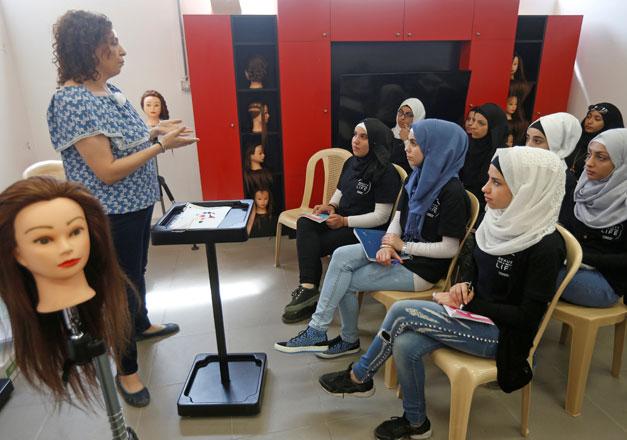You are here
For Syrians in Lebanon, no resting place in life or death
By AFP - May 22,2016 - Last updated at May 22,2016

A tombstone overlooks the town of Bar Elias in Lebanon’s Bekaa Valley on May 13, 2016 (AFP photo)
BAR ELIAS, Lebanon — As if losing three infants in exile in Lebanon were not heartbreaking enough, Syrian refugee Ahmad Al Mustafa then had to relive the ordeal as he pleaded to find them a grave.
“I had three babies over three years. Each time, they died,” the 29-year-old construction worker from Aleppo city says, standing outside his makeshift home in Lebanon’s Bekaa region.
“The problem was where to bury them,” he adds, his tone matter-of-fact, as if numbed to the suffering.
Five years into the Syria conflict, Lebanon hosts more than one million refugees from the war-torn country, according to the United Nations.
More than a third live in the Bekaa valley near the Syrian border.
As towns there strive to accommodate tens of thousands of Syrian arrivals, some local councils are struggling to provide them with burial services because town cemeteries are almost full.
After fleeing Syria five years ago, Mustafa and his wife lost three babies — aged three months, five days and just two hours old.
When their first infant died, he approached someone he knew in a nearby town, who he says was kind and gave him a tiny corner of their family’s burial plot.
When their second baby died, “we were forced to open up the old grave and we buried them together”, Mustafa says.
With the help of a religious leader, he buried his third child in yet another district.
“We just ask the state and religious authorities to find us a plot of land not suitable for farming, so that if someone dies we can bury them,” Mustafa pleads.
‘Town can’t take it’
Mustafa, his wife and two surviving children live in a refugee settlement outside the town of Bar Elias, whose population has doubled with refugee arrivals since 2011, officials say.
Even before the war broke out in Syria — killing more than 270,000 people and displacing millions — the town’s old cemetery was full, they say.
“There’s no more space in the old graveyard — for Syrians or Lebanese,” says Saad Mayta, the town’s outgoing mayor.
The graveyard stands on a small hill in town, its tombs packed so tight that visitors among its tall poppies and wild grass struggle to avoid stepping on a grave.
A few burial chambers teeter dangerously off its highest point, where the hill drops suddenly from erosion.
Mayta says around 70,000 Syrian arrivals have severely strained the town’s waste, sewage, water, and electricity networks — as well as its burial services.
Death rates among Syrian refugees are much higher than among the local population, authorities and international organisations say, because they are more vulnerable.
At least two thirds of Lebanon’s Syrian refugees live in extreme poverty, according to the United Nations.
There are no official statistics, but Mayta says someone in the town’s Syrian community dies every one or two weeks.
“The solution is that Syrians go home to their country,” says the soft-spoken official.
“The town can’t take it. We can hardly handle all the Lebanese.”
Even for Syrians who can find a plot of land to bury their loved ones, the cost per grave can sometimes be as high as $250.
‘Buried in secret’
Outside town in a refugee settlement pitched between a potato field and a courgette plot, a young Syrian mother who refused to give her name says her stillborn boy was buried in secret.
A cemetery guard turned her husband away in a nearby town, telling him “Syrians can’t bury their children here.”
But he “took him back in the evening and buried him in secret”.
In the blazing sun outside the tent she shares with her two daughters, children with light blue backpacks wait for the school bus.
Bar Elias opened a new cemetery this month in the run-up to municipal elections.
Local sheikh Wissam Mohammed Anouz says it will contain 10 to 20 burial chambers “for our brothers, the Syrian displaced”.
But Anouz concedes the solution is temporary.
Anouz says he and colleagues from the Bekaa tried to find land for a cemetery specifically for Syrians, but no one would sell.
“If a metre square was $10, it became $50 as soon as they learned it would become a burial ground,” he said.
Standing amid temporary homes wrapped in advertising posters for insulation, Mustafa says he wishes he had never come to Lebanon.
In Syria, “we have land, houses and livelihoods but we were forced to leave with nothing”, the father says, his voice high with emotion.
“Is it too much to ask for a tiny grave?”
Related Articles
Residents of the small northern town of Johfiyeh may have to wait for months until they find space to bury their dead, according to government and municipal officials.
BAR ELIAS, Lebanon —At the entrance of a rural town in Lebanon's Bekaa valley, a blue sign says "Welcome to Bar Elias, population 50,0
BAR ELIAS, Lebanon — As a Syrian refugee in Lebanon, Nour knows life can be tough. So the 15-year-old leapt at the chance to train as a












